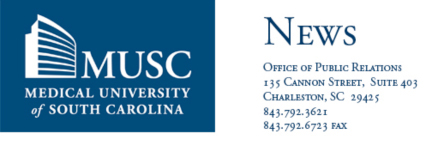
March 2, 2009
CHARLESTON -- The Medical University of South Carolina (MUSC) Hollings Cancer Center has attained National Cancer Institute (NCI) designation, a distinction held by only 63 other cancer centers in the U.S. The Hollings Cancer Center (HCC) is the only institution in South Carolina with this prestigious status.
Andrew S. Kraft, MD, director of the Hollings Cancer Center (HCC), said being named one of the top cancer research centers in the country signals that MUSC/HCC researchers and physicians are leaders in discovering, developing, and delivering cutting-edge treatments based on laboratory research to patients in South Carolina and beyond. The immediate benefit to patients is increased access to early clinical trials offering promising new treatments.
"We are honored and proud to have earned this recognition. It is a distinction earned over many years through collaboration and innovation by dedicated researchers, clinicians, and staff throughout Hollings Cancer Center and MUSC," Dr. Kraft said. "By sharing what we know with other cancer centers and practices throughout our state, we can step up our war on cancer in South Carolina and beyond. Our citizens don't have to leave the state to find the most advanced research and protocols from an NCI center - we have one right here in our back yard."
NCI designation is accompanied by more than $7 million in funding to sustain and grow research efforts at MUSC. The NCI awarded designation to HCC based on its outstanding facilities, commitment to research, leadership, and vision.
Former U.S. Senator Ernest "Fritz" Hollings, for whom the cancer center was named in 1993, hailed the federal designation as nothing less than South Carolinians deserve.
"This is a true milestone for the Medical University of South Carolina," he said. "One can see that the cancer building is a winner, but now all in the state can know that the doctors and staff of MUSC's cancer center are winners. Dr. (Raymond)Greenberg (MUSC president), Dr. Kraft and the staff are to be congratulated."
NCI-designated cancer centers are characterized by scientific excellence and the capability to integrate diverse research approaches that focus on cancer. They play a vital role in advancing the goal of reducing morbidity and mortality from cancer through increased clinical trials that offer patients new drugs and treatment protocols that would be unavailable to them otherwise.
U.S. Senator Lindsey L. Graham called the designation a "game-changer" for the thousands of South Carolinians with cancer.
"Cancer is one of the leading causes of death in the nation and practically every family in our state has been impacted by this horrible disease. The Hollings Cancer Center will now take its place among an elite group of institutions in the major leagues of cancer research," Graham said. "The NCI designation only comes to the best and brightest. It is a compliment to the men and women who put in countless hours at this facility and recognition that the Hollings Cancer Center is among the best of the best in cancer research."
Designation also holds the potential to spur South Carolina's economy by attracting public and private funding for new endeavors.
Greenberg, MD, PhD, praised the efforts of many that made designation possible.
"Under the leadership of former MUSC President Jim Edwards, and with the support of Senator Hollings, MUSC set the goal of obtaining NCI designation more than a decade ago," Greenberg said. "Now that this dream has come true, we gratefully acknowledge all who have made it possible, especially Dr. Kraft and his outstanding team. We also thank those like Jim Edwards and Fritz Hollings, whose vision and determination set this entire process in motion."
According to the NCI, designated cancer centers are a major source of discovery of the nature of cancer and of the development of more effective approaches to cancer prevention, diagnosis, and therapy. They also deliver medical advances to patients and their families, educate health-care professionals and the public, and reach out to underserved populations. They are characterized by strong organizational capabilities, institutional commitment, and trans-disciplinary, cancer-focused science; experienced scientific and administrative leadership, and state-of-the-art cancer research and patient care facilities. ###
About Hollings Cancer Center
Hollings Cancer Center at the Medical University of South Carolina is the largest academic-based cancer program in South Carolina, with more than $35 million in research funding. More than 500 people are currently participating in cancer clinical trials at HCC. To expand patient access to clinical trials, MUSC Hollings Cancer Center has established the Clinical Trials Network (CTN). Partnering with nine cancer programs in South Carolina, the CTN broadens the reach of new research that may one day be the new standards of care.
Hollings Cancer Center offers state-of-the-art diagnostic capabilities, therapies and surgical techniques and has multidisciplinary clinics that involve surgeons, medical oncologists, radiation therapists, radiologists, pathologists, psychologists and many other specialists seeing patients under one roof. Multidisciplinary care is provided in disease specific clinics such as thoracic, breast, head and neck, genitourinary, gastrointestinal, hematological, and pediatric cancers. For more information, please visit www.hcc.musc.edu.
About MUSC
Founded in 1824 in Charleston, The Medical University of South Carolina is the oldest medical school in the South. Today, MUSC continues the tradition of excellence in education, research, and patient care. MUSC educates and trains more than 3,000 students and residents, and has nearly 11,000 employees, including 1,500 faculty members. As the largest non-federal employer in Charleston, the university and its affiliates have collective annual budgets in excess of $1.6 billion. MUSC operates a 750-bed medical center, which includes a nationally recognized Children's Hospital and a leading Institute of Psychiatry. For more information on academic information or clinical services, visit www.musc.edu or www.muschealth.com.
#####